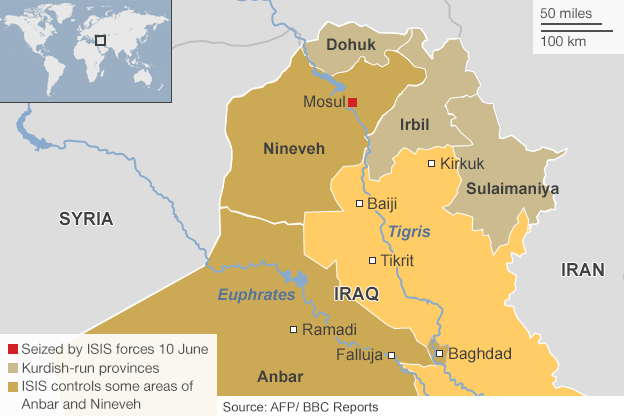 Mosul resident Mohammed Younis says he had nothing to do with the Islamic State group’s capture of his city or its mass killings, beheadings and other atrocities — but that may not be enough to spare him if the extremists are driven out.
Mosul resident Mohammed Younis says he had nothing to do with the Islamic State group’s capture of his city or its mass killings, beheadings and other atrocities — but that may not be enough to spare him if the extremists are driven out.
A letter left on his doorstep by a shadowy group calling itself the Freemen of Mosul said “vengeance is coming,” and contained vague threats of eye-for-an-eye retribution. Dozens of other Mosul families have reported similar threats, and as Iraqi forces backed by feared Shiite militias gradually push up from Baghdad into the Sunni heartland, some fear the retreat of the extremist group could set off a new round of violence.
Younis thinks he was targeted because his cousin is a suspected Islamic State militant. “Because of the acts of a criminal cousin, me and some of my relatives will be killed or displaced,” he said. “We have nothing to do with Daesh, but I think that nobody will listen when payback time comes,” he added, using the Arabic acronym for the group.
Iraqi troops and Iranian-backed Shiite militias launched a long-awaited offensive this month aimed at capturing Saddam Hussein’s hometown of Tikrit, a Sunni bastion on the Tigris river whose capture would pave the way for an assault on Mosul, which could come as soon as next month.
Iraq’s government has sought to rally Sunni support, hoping to recruit powerful tribes to drive out the extremists and reunite the country. But past offensives have been followed by threats and reports of vicious sectarian reprisals.
Last week, New York-based Human Rights Watch called on the Iraqi government to protect civilians in Tikrit and allow them to flee combat zones. Its statement noted “numerous atrocities” against Sunni civilians by pro-government militias and security forces, ranging from “summary executions, revenge killings, or other abuses.”
Sunni farmer Marwan al-Bayati fled his home to the nearby city of Kirkuk when Shiite militiamen approached his militant-held village last September. As he prepared to return a month ago, he received anonymous phone calls warning that death awaited him if he and his family returned.
“When I told the callers that I am a peaceful man who did not take part in any killings, the answer I got was that my relatives are supporting Daesh, which means my properties are their war trophies,” he told The Associated Press.
The reprisals thus far pale in comparison to the misdeeds of the Islamic State group, which has massacred hundreds of Syrian and Iraqi soldiers, beheaded Western journalists and aid workers, and imposed a violent interpretation of Islamic Law in which people have been beheaded, mutilated or crucified in public squares. The extremist group has deliberately targeted the country’s Shiite majority as well as religious minorities, sharpening sectarian tensions that could drive future reprisal attacks.
After Islamic State fighters killed hundreds of Yazidis — a religious minority the extremists view as apostates — and enslaved hundreds of Yazidi women and girls, the community began arming itself. In January a newly formed Yazidi militia, which works closely with U.S.-backed Kurdish forces in the north, stormed the Sunni village of Snuny, killing 11 men and briefly abducting several women.
Sunnis and Yazidis had by and large co-existed peacefully before the Islamic State group’s blitz across northern Iraq last summer. But a Yazidi fighter, who spoke to The Associated Press anonymously for fear of retribution, said those days are over. “We don’t mind if we kill every one of our Sunni neighbors,” he said. “We will never trust them again.”
Sunnis may have more to fear from the thousands of Shiite militiamen taking part in the latest offensive. Last year Amnesty International said Shiite militias have captured and killed Sunni militants and those alleged to have supported them. Like their rivals in the Islamic State group, Shiite militiamen have posted grisly videos online.
In one, a man wearing the fatigues of a Shiite militia is seen propping up the head of a bearded man next to a decapitated body. “Why don’t you burn him,” asks another militiaman. “You don’t need to do that,” a third says. “You already beheaded him.”
Tikrit is of special concern because it was the site of one of the Islamic State group’s biggest massacres. Last summer Islamic State militants led hundreds of mainly Shiite Iraqi soldiers out of a base near Tikrit known as Camp Speicher, lined them up in front of trenches and shot them dead. They published pictures of the mass killing online, boasting about the atrocity.
Last week, Asaib Ahl al-Haq, a powerful Shiite militia taking part in the Tikrit offensive, posted a statement on Facebook vowing “a battle to impose justice and avenge the martyrs of Camp Speicher.”
Prime Minister Haider al-Abadi last week called on his forces to protect civilians and their property in re-captured areas, vowing zero tolerance for any violations.
But Sunni lawmaker Raad al-Dahlaki said the liberation of militant-held areas could be the start of a new round of violence.
“Those who work with Daesh represent themselves only… On the other hand, there is a huge amount of weapons in the hands of outlawed groups,” he said. “We should expect chaos.”
My Way/AP

Leave a Reply
You must be logged in to post a comment.